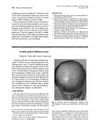 56 citations,
November 1993 in “Journal of The American Academy of Dermatology”
56 citations,
November 1993 in “Journal of The American Academy of Dermatology” Capsaicin cream quickly relieved itching in two patients with brachioradial pruritus.
 9 citations,
November 1993 in “Journal of The American Academy of Dermatology”
9 citations,
November 1993 in “Journal of The American Academy of Dermatology” Some men can have female pattern baldness without hormonal abnormalities or signs of feminization.
28 citations,
August 2013 in “Hypertension” Potassium channel openers help form elastic fibers in arteries and can treat elastin deficiency and hypertension.
 5 citations,
February 2019 in “The New England Journal of Medicine”
5 citations,
February 2019 in “The New England Journal of Medicine” Certain mutations in the PADI3 gene may increase the risk of developing a type of scarring hair loss common in women of African descent.
 54 citations,
July 2002 in “Clinical and Experimental Dermatology”
54 citations,
July 2002 in “Clinical and Experimental Dermatology” DHT, a testosterone byproduct, causes male pattern baldness.
 7 citations,
September 2008 in “Dermatologic surgery”
7 citations,
September 2008 in “Dermatologic surgery” Hair transplantation can successfully treat stubborn alopecia areata.
 15 citations,
August 2020 in “BioMed Research International”
15 citations,
August 2020 in “BioMed Research International” BTA safely and effectively treats hair loss, and works better with FNS.
 18 citations,
January 2013 in “Postepy Dermatologii I Alergologii”
18 citations,
January 2013 in “Postepy Dermatologii I Alergologii” Puberty often causes skin issues like acne and excessive sweating, and treatments require patience as results may vary.
 July 2018 in “Elsevier eBooks”
July 2018 in “Elsevier eBooks” Frontal Fibrosing Alopecia is a type of hair loss affecting mostly older women, with no agreed best treatment.
 14 citations,
December 2016 in “Sexual Medicine”
14 citations,
December 2016 in “Sexual Medicine” Finasteride side effects in young men may be linked to specific gene variations.
 52 citations,
June 1981 in “International Journal of Dermatology”
52 citations,
June 1981 in “International Journal of Dermatology” Oral retinoids are effective for severe skin conditions but require careful use due to side effects.
 25 citations,
March 2012 in “Journal of Dermatological Science”
25 citations,
March 2012 in “Journal of Dermatological Science” Genetic variants linked to ten skin diseases were found, showing both immune and non-immune factors play a role.
2 citations,
February 2021 in “Case reports in dermatological medicine” The new topical botanical formulation significantly regrew hair in all five patients without side effects.
 24 citations,
November 2023 in “Nature”
24 citations,
November 2023 in “Nature” The extracellular matrix affects where tumors can start in the body.
Eating a lot of soy might lower the chance of early hair loss in men likely to get it.
 1 citations,
January 2016 in “Elsevier eBooks”
1 citations,
January 2016 in “Elsevier eBooks” The document concludes that identifying the specific cells where skin cancers begin is important for creating better prevention, detection, and treatment methods.
 75 citations,
January 2009 in “International journal of trichology”
75 citations,
January 2009 in “International journal of trichology” Hair grays due to oxidative stress and fewer functioning melanocytes.
 April 2024 in “Human genomics”
April 2024 in “Human genomics” Identified genes linked to male-pattern baldness may help develop new treatments.
 118 citations,
October 2013 in “Trends in Genetics”
118 citations,
October 2013 in “Trends in Genetics” The AUTS2 gene is linked to neurological disorders and may affect human brain development and cognition.
 13 citations,
March 2017 in “Genomics”
13 citations,
March 2017 in “Genomics” Genomic approach finds new possible treatments for hair loss.
 1 citations,
February 2022 in “Online journal of biological sciences”
1 citations,
February 2022 in “Online journal of biological sciences” The document does not determine if adults with aphallia are fertile.
 8 citations,
April 2016 in “Anais Brasileiros De Dermatologia”
8 citations,
April 2016 in “Anais Brasileiros De Dermatologia” Right hand finger ratio may predict male hair loss.
 140 citations,
February 2020 in “Frontiers in Plant Science”
140 citations,
February 2020 in “Frontiers in Plant Science” RNAi-based biopesticides could be safe and effective for pest control with careful development and risk assessment.
 40 citations,
March 2016 in “The Journal of Clinical Endocrinology & Metabolism”
40 citations,
March 2016 in “The Journal of Clinical Endocrinology & Metabolism” Young girls whose mothers have PCOS may have higher activity of a specific enzyme that could lead to developing PCOS later.
 2 citations,
July 2022 in “Frontiers in Medicine”
2 citations,
July 2022 in “Frontiers in Medicine” The cause of Frontal fibrosing alopecia, a type of hair loss, is complex, likely involving immune responses and genetics, but is not fully understood.
 12 citations,
June 2018 in “Journal of Cosmetic Dermatology”
12 citations,
June 2018 in “Journal of Cosmetic Dermatology” PRP is effective for hair loss and might work better with other treatments, but more research is needed.
 August 2024 in “Clinical Cosmetic and Investigational Dermatology”
August 2024 in “Clinical Cosmetic and Investigational Dermatology” Hypothyroidism may cause certain types of hair loss.
11 citations,
July 2021 in “Genetics selection evolution” Researchers found genes and genetic variants linked to sheep wool and skin wrinkles.
16 citations,
September 2015 in “International Journal of Molecular Sciences” A specific gene variant causes severe skin issues and increases infection risk, requiring careful medical monitoring.
 153 citations,
March 2017 in “Endocrine”
153 citations,
March 2017 in “Endocrine” Male pattern baldness involves genetics, hormones, and needs better treatments.

























